
Nepenthes philippinensis is a tropical pitcher plant endemic to the Philippines. It is known from Palawan and the neighbouring Calamian Islands and Linapacan, where it grows at 0–600 metres (2,000 ft) above sea level.

Lissocarcinus is a genus of crabs containing the following nine species :
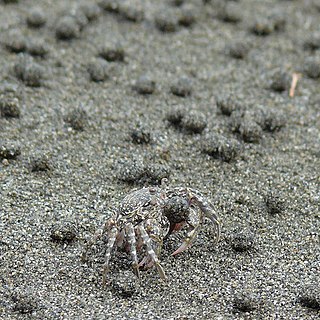
Sand bubbler crabs are crabs of the genera Scopimera and Dotilla in the family Dotillidae. They are small crabs that live on sandy beaches in the tropical Indo-Pacific. They feed by filtering sand through their mouthparts, leaving behind balls of sand that are broken up by the incoming high tide.

Macrophthalmus is a genus of crabs which are widespread across the Indo-Pacific. It contains the following species : Species in this genus are often referred to as sentinel crabs.

Charybdis is a genus of swimming crabs in the family Portunidae. It is named after the monster Charybdis of Greek mythology.
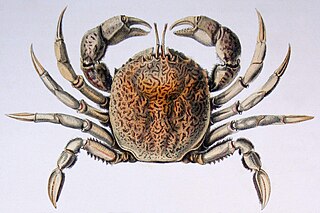
Belliidae is a family of crabs of the order Decapoda.

Goneplacidae is a family of crabs of the order Decapoda and the superfamily Goneplacoidea. It includes the following genera:
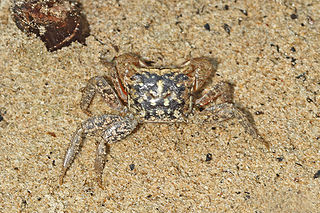
Metopograpsus is a genus of crabs, containing the following extant species:

Panopeus is a genus of crabs, containing these extant species:

"Semper Fidelis", written in 1888 by John Philip Sousa, is regarded as the official march of the United States Marine Corps. This piece was one of two composed in response to a request from United States President Chester A. Arthur for a new piece to be associated with the United States President. The words semper fidelis are Latin for "always faithful." The piece was created for a wind band in addition to a percussion section. There is a very prominent drum solo in the middle of the piece which includes a skillful dynamic change. It features staccato notes and sharp tonguing.
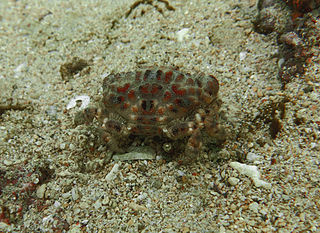
Paractaea is a genus of crabs in the family Xanthidae, containing the following species:

Pilodius is a genus of crabs in the family Xanthidae, containing the following species:

Pseudomedaeus is a genus of crabs in the family Xanthidae, containing the following species:

Garthiope is a genus of crabs in the family Pseudorhombilidae, containing the following species:

Leptodius is a genus of crabs in the family Xanthidae, containing the following species:

Micropanope is a genus of crabs in the family Pseudorhombilidae, containing one exclusively fossil species and the following species:
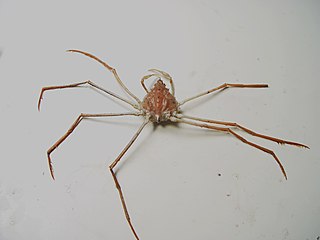
Inachoididae is a family of crabs originally erected by James Dwight Dana in 1852. It was not recognised as a valid family until the early 1980s. Its members closely resemble those of the family Inachidae, and the Inachoididae could be recognised as a subfamily of that family.

Ebalia is a genus of crab in the family Leucosiidae.

Dynomenidae is a family of crabs in the superfamily Dromioidea mostly found in Madagascar. There are nineteen genera in this family: five extant and fourteen known from fossils:

Heterocyathus is a genus of coral of the family Caryophylliidae.




















